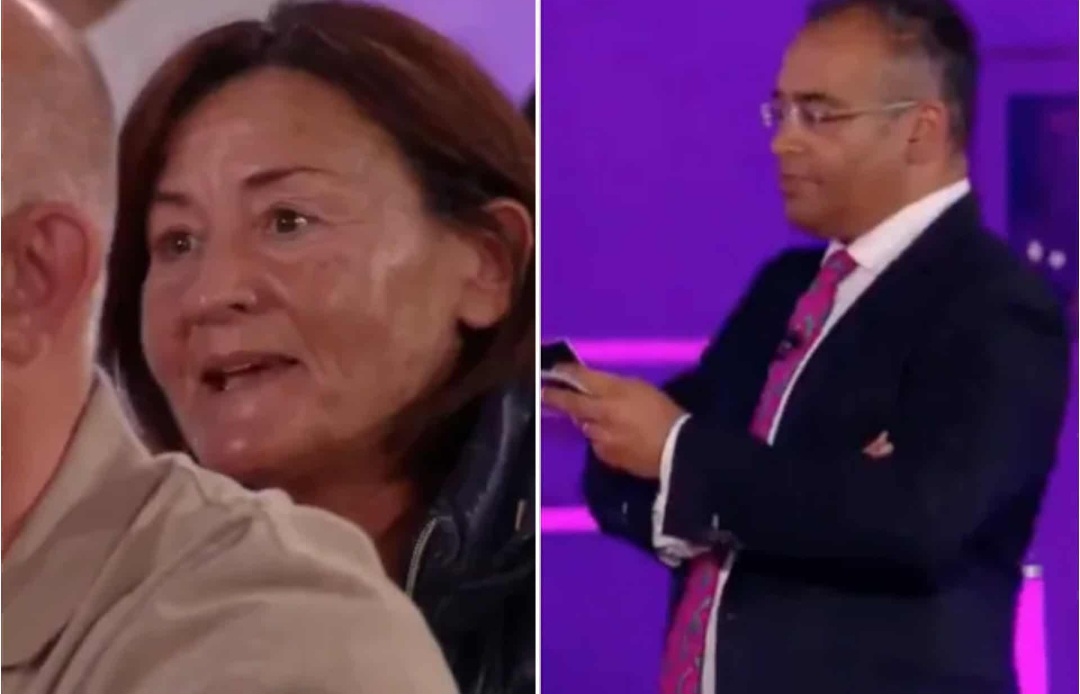
Selena, a woman of strength and grace, dawned in her simple yet needed tire, entered the local grocery store. The single mother of two young girls, she was the epitome of resilience, having dedicated her life to the well-being of her children. Despite the many challenges she faced in her day-to-day life, Selena always carried an aura of dignity and warmth that made her a respected figure in her community.
On this particular weekend, she walked down the fresh produce aisle, carefully selecting fruits and vegetables for the upcoming week. Her fingers gently probed the produce for ripeness, her eyes gleamed with the wisdom of making ends meet. She was deeply engrossed in her task, her thoughts preoccupied with making the best choices for her budget and her family’s health.
Suddenly, a sharp voice cut through her concentration. The store’s manager, a man with a stern face and unsympathetic eyes, stood in front of her. He spoke in a tone devoid of kindness or respect, his words rooted in the worst kind of prejudice. He demanded that Selena leave the store, alleging that her skin color was the reason.
The world seemed to freeze around Selena as the words echoed in her ears, bouncing off the walls of her heart. Each echo stabbed like a knife. She felt her throat tighten, her dignity crumble under the weight of the manager’s words. But the fire in her soul was not extinguished; it blazed brighter, swallowing her humiliation. She held her head high and exited the store, leaving behind a chilling silence.
Across the street, retired army colonel Robert Ferguson watched the unfolding drama with widening eyes and a rising sense of anger. Having served in numerous wars, he was a hard-boiled veteran, his heart scarred from battles fought and friends lost. Yet, the fight for equality was one war he was still fervently waging.
Observing the blatant discrimination, his hand instinctively clenched into a fist. He could feel a rush of adrenaline, much like stepping onto a battlefield. Only this time, the enemy was not in fatigues but in the ordinary clothing of prejudice and ignorance. Robert watched as Selena, with an air of undeniable grace, left the store. His heart clenched at the blatant unfairness of the situation.
The sight of a woman who reminded him of the civilians he had vowed to protect during his years in the military being treated so poorly was a harsh reminder of the battles still to be fought at home. The scene imprinted itself on Robert’s mind, fueling his resolution to rectify this injustice. It wasn’t just about Selena; it was about every person who had ever been marginalized due to the color of their skin.
His mind began racing, crafting a plan of action that combined his military discipline and strategizing skills. The incident had deeply impacted him, highlighting the reality of discrimination in the most ordinary places. And he was now more determined than ever to advocate for equality.
Robert was not a man to stand idly by in the face of injustice. His military background had equipped him with a distinct moral compass, one that gravitated towards fairness and equality. Gathering his resolve, he crossed the street, his steady strides carrying the unmistakable air of a man on a mission. He entered the grocery store and sought out the manager.
When he confronted the manager about the blatant display of racism he had witnessed, he was met with a dismissive wave and a haughty smirk. The manager’s blatant indifference towards the incident made Robert’s blood boil, but he maintained his calm. His words were measured yet stern as he voiced his concerns. However, the manager simply shrugged, reinforcing the toxic culture that seemed to have ingrained itself in the store’s very fabric.
Undeterred, Robert left the store, the weight of his responsibility to correct the wrong done to Selena growing heavier with each step. He walked the familiar path to her house, knocking softly on her front door. When she answered, her face etched with wariness and surprise, he expressed his sincere desire to rectify the situation.
Selena was initially hesitant, unsure of opening herself up to potential further pain. Yet, as Robert continued to speak, she saw the genuine concern in his eyes, the steadfast determination in his stance. His promises to make a difference didn’t ring hollow but echoed with the sincerity of a man who had dedicated his life to service and justice. His determination touched something deep within her, and she began to believe that this fight was not one she had to wage alone.
Over cups of steaming tea, they brainstormed ideas, united in their quest to teach the store’s employees a lesson about equality and respect. Robert’s military strategy mixed with Selena’s understanding of the community and their shared belief in their cause quickly turned into a viable plan. They discussed rallies, meetings with community leaders, and even the possibility of legal action.
As the evening shadows grew long, they had outlined a strategy that was as much about highlighting the injustice as it was about bringing about change. It wasn’t a straightforward fight, they knew, but they also knew that their combined determination and the righteousness of their cause would make it a battle worth fighting.
By the time Robert left Selena’s house, their plan was in motion. A shared determination had bloomed between them. The fight against unfairness would not be easy, but the seed of change had been sown. A retired colonel and a single mother had embarked on a mission, not just for themselves but for every individual who had faced discrimination in their lives. And in that shared mission, they found strength and hope.
The sharp rays of the morning sun found Robert immersed in planning. His kitchen table was strewn with documents, maps of the town, and a half-empty coffee mug. His military background had taught him the importance of thorough preparation. However, this was not a war against a foreign enemy but a fight for equality in his own neighborhood.
Robert’s strategy was comprehensive. It blended the principles of military tact with the urgency of a civil rights movement. The first stage of his plan involved rallying community support. He knew from his years of service that unity was a potent weapon capable of toppling the strongest fortresses of resistance. Together with Selena, they started organizing community gatherings in parks, churches, and local halls. They explained the situation, not just Selena’s humiliation, but the deeper issue of discrimination that it represented.
Their message was straightforward: boycott the local grocery store until the manager issued a public apology and promised to treat all customers equally. The response was overwhelming. People from all walks of life, irrespective of color, religion, or status, came forward to support their cause.
However, Robert knew that local support, while crucial, might not be enough to force a change. He tapped into his contacts from his military days, finding allies in journalists and broadcasters. They reached out to local and national media, sharing Selena’s story. Once Selena’s story was aired, it resonated with viewers, becoming an emblematic incident of everyday racism.
The media exposure also led to an outpouring of similar stories from other communities, further highlighting the urgent need for change. Selena, once a victim, was now a beacon of hope for many. The battle against discrimination was fought on multiple fronts. Robert continued to leverage his strategic skills to keep their campaign on track.
Each passing day added more supporters to their cause, and the pressure on the store’s management continued to build. On the other hand, Selena on the other hand, Selena, who had once experienced the cold shoulder of her community, was now at the heart of a local movement. Her house became a hub for planning meetings and media interviews. Her story, instead of being a quiet whisper of injustice, was now a loud clarion call for change. She was no longer just a customer unjustly thrown out of a store; she was a symbol of resistance against prejudice.
Through all these efforts, the importance of strategy, unity, and public support was evident. The coordinated boycott hit the store where it hurt most—its profits. The media spotlight kept the issue alive, ensuring that it did not fade into the background. Each community gathering added more voices to their cause, with the collective residents creating a powerful echo against discrimination.
As the weeks rolled on, the unity of the community, the spreading media coverage, and the diminishing customers at the store signaled that their strategy was working. However, Robert and Selena knew that their fight was far from over. They had begun a battle against a deeply ingrained societal issue, and they would not rest until they saw real tangible change.
This was not just a war for justice for Selena; it was a fight for equality for everyone who had ever felt the sting of discrimination. The weeks of relentless boycott and escalating media attention began to take a toll on the store. The aisles, once teeming with customers, stood deserted. The cash registers that constantly chimed with sales were silent. The shelves filled with goods bore the cost of the store’s tarnished reputation.
The constant public outcry for justice echoed in every empty corner of the store, reaching the ears of the owner. The store owner, compelled to intervene, recognized the manager’s attitude as the root of their plummeting business. It became abundantly clear that the manager’s dismissal was the only viable solution to quell the public unrest.
The choice was made, and the manager was let go. His prejudiced behavior was no longer welcomed or tolerated. As the news of the manager’s dismissal spread, it signaled a crucial victory for Robert and Selena’s campaign. The store, keen on rebuilding its reputation, appointed a new manager, one who was open to change and willing to address the deep-rooted discrimination within the store.
Taking their commitment a step further, the new manager agreed to Robert’s suggestion for diversity training for the entire staff. A local organization specializing in anti-racism and inclusivity training, recommended by Robert, was brought in. Their task was to educate the store’s staff on the importance of treating every customer with respect and equality.
The change within the store was palpable. The atmosphere, once marred by prejudice, was replaced with an air of learning and change. The staff, once dismissive of customers based on their color, were now learning the true values of equality and respect.
In the midst of these changes, Selena received an invitation from the store. With a heart filled with nervous anticipation, she walked into the store. The new manager, standing at the entrance, welcomed her with an earnest apology. His words echoed through the store’s public announcement system, reaching every aisle, every corner. It wasn’t just an apology to Selena, but a commitment to every customer that the store would uphold the values of fairness and equality henceforth.





The world could be a better place to live in, if we all could look at any person equal without looking at the color, color is but a shell covering the soul the spirit & blood.